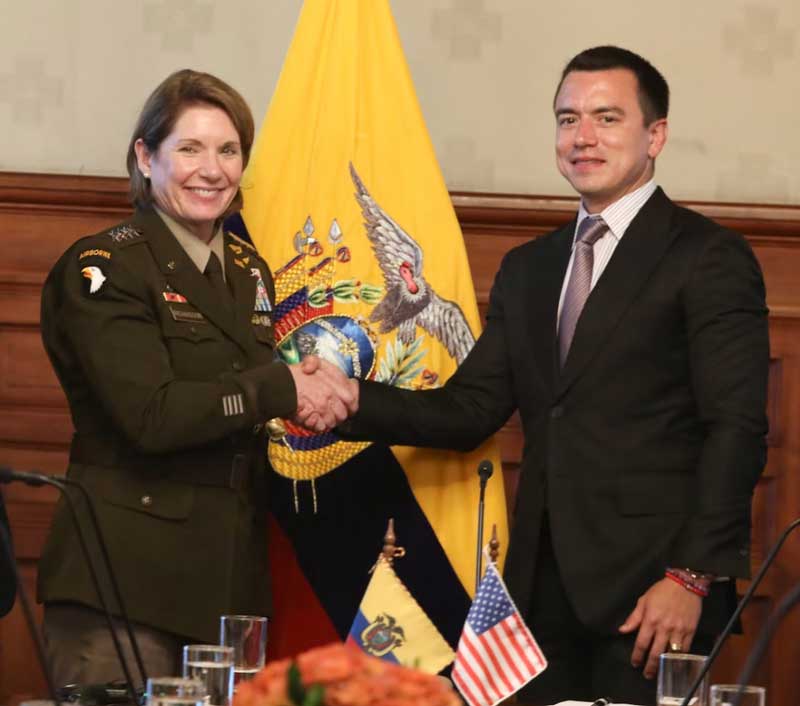In the annals of Ecuadorian history, the first 100 days of President Daniel Noboa’s administration will be remembered as a period of political dynamism and strategic decision-making.
From confronting internal armed conflict to navigating economic challenges and fostering international relations, first 100 days of Daniel Noboa’s presidency have been marked by a flurry of activities aimed at addressing the multifaceted issues facing the nation. As we delve into the milestones and controversies of his early presidency, it becomes evident that these initial days have set the stage for a transformative journey in governance.
Confronting Internal Armed Conflict
One of the defining moments of Noboa’s presidency occurred barely a month into his term when he made the bold decision to declare the country in a state of “internal armed conflict.” The trigger for this declaration was the brazen takeover of a television channel by an armed group in Guayaquil. This decisive action allowed for the mobilization of the Armed Forces and National Police to combat organized crime groups wreaking havoc across the nation.
The subsequent crackdown on criminal elements resulted in significant arrests and operations, garnering widespread support from the populace. According to Cedatos, an overwhelming majority of citizens, 85.1%, endorsed Noboa’s approach to tackling insecurity and narcoterrorism. However, criticisms from dissenting voices underscored the challenges inherent in navigating such complex issues.
Economic Reforms and Fiscal Management
In tandem with addressing security concerns, Noboa’s administration embarked on a series of urgent economic reforms aimed at bolstering the nation’s financial stability. Collaborative efforts with political factions such as the Correístas and Social Christians facilitated the passage of crucial legislation, including tax reforms and measures to enhance energy efficiency.
Central to these reforms was the contentious decision to increase the Value Added Tax (VAT) to 15%, a move intended to generate revenue for financing the internal conflict. Despite initial apprehensions, the VAT hike did not incite widespread unrest, signaling a degree of resilience within Ecuador’s economic landscape.
Furthermore, Noboa’s proactive fiscal management, characterized by the implementation of temporary taxes and efforts to review subsidies, elicited cautious optimism from experts. While challenges persist, such as the need to address structural deficiencies and reduce dependency on external financing, the administration’s strides towards fiscal prudence have laid a foundation for long-term sustainability.
Diplomatic Engagements and International Relations
Beyond the confines of domestic affairs, Noboa’s administration has actively engaged in bolstering Ecuador’s international standing, particularly in its relations with the United States. Through strategic agreements on security cooperation, the president reaffirmed Ecuador’s commitment to combating transnational threats and fostering bilateral partnerships.
However, not all diplomatic endeavors yielded favorable outcomes, as evidenced by tensions with Russia over a proposed arms exchange. The episode underscored the delicate balance required in navigating geopolitics and safeguarding Ecuador’s interests on the global stage. Yet, amidst the diplomatic impasse, opportunities for collaboration emerged, signaling a willingness on both sides to explore mutually beneficial avenues of engagement.
The Promise of Democratic Governance
Looking ahead, Noboa’s presidency stands at a pivotal juncture, poised to deliver on its promises of democratic governance and inclusive development. The impending popular consultation and referendum, slated for April 21st, offer a platform for citizen participation and collective decision-making on critical issues such as security and judicial reform.
While the path forward may be fraught with challenges, Noboa’s commitment to transparency and accountability bodes well for Ecuador’s democratic trajectory. By fostering an inclusive dialogue and embracing diverse perspectives, his administration has the potential to forge a more resilient and equitable society.
The first 100 days of President Daniel Noboa’s administration have been marked by a convergence of challenges and opportunities, underscoring the complexities inherent in governing a nation in flux. From confronting internal strife to navigating economic headwinds and fostering international partnerships, Noboa’s leadership has been defined by its resolve and adaptability.


So far, it looks good for Noboa. He’s no Melei, but it seems Noboa’s heart is in the right place. Now he needs more action, a la Melei.